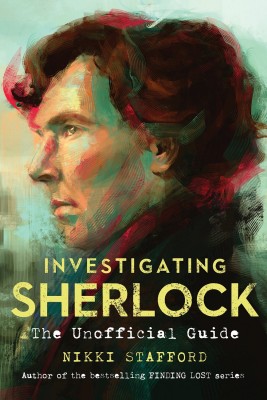Investigating Sherlock – The Unofficial Guide is an examination of the BBC’s contemporary Sherlock Holmes series, Sherlock. The author, Nikki Stafford, has done a number of books such investigative tomes on television series (Bite Me! The Unofficial Guide to the World of Buffy the Vampire Slayer, the Finding Lost series) but this is the first that I’ve read, and it is a lovely bit of scholarship without being in slightest bit dry.
Investigating Sherlock by Nikki Stafford; ECW Press; 240 pages; 18.95; ISBN 978-1-77041-262-0
In The Case of the Investigator Investigating Sherlock, and despite putting together a book filled with marvelous insights and theories, Ms. Stafford loses points for the oh-so-very obvious mistake of getting Elementary’s network wrong (CBS, not NBC!). On the other hand, she certainly does know her BBC Sherlock.
Investigating Sherlock is formatted thusly: a ‘genesis of Sherlock in the introductory ‘Everything Had changed In Ninety Minutes; briefs bios of Benedict Cumberbatch and Martin Freeman and their journey’s to Sherlock stardom (Benedict Cumberbatch: How a Mimic Became a Star; Martin Freeman: Not Just Another Nice Guy) and an equally brief overview of the life and accomplishments of Holmes’ creator (Sir Arthur Conan Doyle: The Father of Sherlock Holmes).
Then we have analyses of the three seasons of the series (or, if you’re British, the three series of the programme), arranged thusly: Cast of Characters page; Season and Theme (e.g. Season One: Dr. Watson, Meet Mr. Holmes), individual episode analysis (1.1 A Study in Pink: The Science of Deduction). Following episode’s analysis, Stafford then lists an episode Highlight; Easter eggs in Did You Notice?; Interesting Facts; Nitpick(s) (questionable moments), and Goofs (outright mistakes).
As an added bonus, Stafford also includes one brief interview per season with a noted Holmes scholar (Sherlockians Weigh In): Season One: Christopher Redmond (Baker Street Irregulars); Season Two: Charles Prepolec (editor of several original Holmes anthologies), and Peter Calamai (Baker Street Irregulars). Their likes and dislikes regarding Sherlock are illuminating.
Stafford has done a lot of homework (her list of reference material is extensive). She’s also not afraid to take the mickey out of the writers when they screw up – pointing out that the treatment of Asians in Sherlock’s second season one episode is no better than the stereotyping in Doctor Who’s The Talons of Weng Chiang (a very Holmes influenced episode) some decades earlier.
She’s also quick to praise the development of the Holmes/Watson friendship in a way that remains true to Conan Doyle characters while being adjusted to fit in our modern era. She even takes issue with The Great Detective himself in regard to his statement, ‘I’m a high-functioning sociopath! Do your research!’ She’s done her research and argues convincingly that Holmes is neither psychopath nor sociopath.
I have to say that there are points she makes that I might quibble about, but she’s able to make it possible to clearly understand why she reaches her conclusions (a trait that she shares with most really good critics – Roger Ebert was a master at this).
Investigating Sherlock is well written and researched (can’t emphasize that enough) so it makes it hard to believe that Stafford really thought that Elementary was an NBC show. Other than that one flaw, though, this is an extremely enjoyable look at what has become a truly global phenomenon, Sherlock.
Final Grade: A
